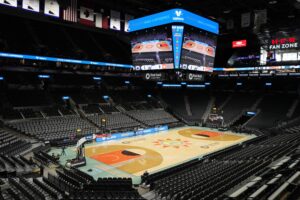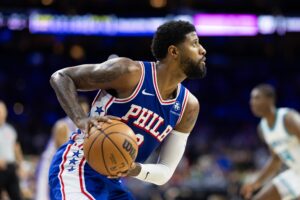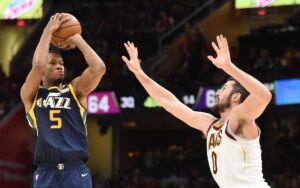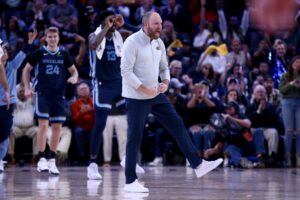In the NBA, being a fringe playoff team is the worst place for a franchise and their outlook for the future. As these teams fight for back-end playoff spots each year, they are neither contenders or tankers but occupy a third area consisting of mediocrity. A perfect team example of this is the current Charlotte Hornets.
The Charlotte Hornets are Mired in Mediocrity
Coming into the season, the Charlotte Hornets were expected to be in the playoff race in the Eastern Conference. Almost midway through the season, the Hornets sit at 15-24 and are neck-and-neck with the hapless Brooklyn Nets in the bottom of the East.
At this point, the Hornets have to make decisions about their future with the ninth-highest paid roster in the league. Their picks are intact for the future, but should they hit the reset button early?
All that is to say: what’s the deal with Charlotte?
The Good
Let’s start with the positives. The Hornets are tied for second in the league in overall rebounding, in large part due to their offseason addition of Dwight Howard. They also rank third in fewest turnovers, a Coach Steve Clifford special.
Charlotte also leads the league in free throw attempts per game by a pretty wide margin. Their defense rating of 104.8 puts Charlotte just outside of the league’s top 10 (11th). Clifford’s scheme hides minus defenders while forcing opponents into tough shots.
Player-wise, the Hornets have one of the more exciting guards in the league in UCONN product, Kemba Walker.
After struggling to find his way in the NBA at first, Walker has transformed himself into a top-tier point guard in the Eastern Conference. Last season was his first all-star campaign where he averaged 23.2 points on shooting splits of 44.4/39.9/84.7 (all career highs).
This year, Walker is putting up 21.8 points and 5.8 assists a night.
The aforementioned Howard has helped fixed the Hornets’ rebounding woes of the past. Howard has regained some of his offensive impacts, averaging 15.6 points and 12.1 rebounds in only 30 minutes a night.
Another bright spot for the Hornets has been the emergence of Jeremy Lamb. Lamb, another UCONN product, is Charlotte’s third-leading scorer and his averages of 14.4 points, 4.6 rebounds, 2.5 assists, 0.8 steals on 35.4 percent from three are all career highs.
Players like Marvin Williams, Michael Kidd-Gilchrist, Frank Kaminsky and Cody Zeller are decent in their roles (albeit overpaid). Despite their overall record, there are some positive pieces in Charlotte.
Also good news, Clifford will be back sometime next week after missing the last month with an undisclosed medical issue. Great to have you back, Coach.
The Bad
Okay, now for the less fun stuff.
Sure, Charlotte leads the league in free throw attempts per game, but they rank 27th in free throw percentage. Most of the points left at the line come from prayers thrown up by Howard (7.8 attempts a game, 53.3 percent).
The overall Charlotte offense is anemic, ranking in the bottom-10 in offensive rating, assists, and field goal percentage. The Hornets are also dead-last in effective field goal percentage* at 49.3 percent.
*effective field goal percentage adjusts for the fact that three-point shots are worth more than twos
Salary Cap Issues
Let’s also revisit the fact that this iteration of the Hornets is the NINTH-HIGHEST payroll in the association. Not great. One name that hasn’t been mentioned so far is Nicolas Batum, so let’s explore this situation.
After being traded from the Portland Trail Blazers to Charlotte in the summer of 2015, Batum reinvigorated the Hornet offense. In his first Carolinian campaign, he averaged 14.9 points, 6.1 rebounds and 5.8 assists as a versatile playmaking wing.
In the money cyclone that was the summer of 2016, the Hornets gave Batum a 5 year/$120 million contract. After playing well last year (career-high 15.1 points), his production has taken a huge hit.
This season, Batum has only played in 25 of Charlotte’s 39 games due to an elbow issue. He hasn’t been able to prove his worth while on the floor, either. Batum is only averaging 10.1 points a game this season while shooting a career-low 28 percent from downtown.
Obviously, the start to this season does not mean he can’t bounce back and be productive once more. However, the point still stands that Charlotte is paying Batum through the 2020-21 season. There’s no chance he declines his $27 million player option for that year.
To make the cap situation worse, the trio of Williams, Kidd-Gilchrist and Cody Zeller (all fine players) are each making over $12 million through at least the ’19-20 season.
Draft Picks
In the 2017 NBA Draft, the Hornets added two players: Malik Monk and Dwayne Bacon. Neither is averaging over six points or shooting above 36 percent from the field. With time, one or both could develop into a positive player, so the jury is still out.
Since drafting Walker in 2011, Charlotte has been able to find useful players in the first round, but none of them have become stars. Players like Kidd-Gilchrist and Kaminsky are great to have around, but you have to hit on picks and get franchise players at some point.
Charlotte has all of their first-round picks from now until 2024.
The Future
The Hornets have difficult decisions to make. Walker, still only 27, is under contract for a bargain $12 million through the end of next season (’18-19). Do they wait around for him to hit unrestricted free agency and re-sign him to a maxed-out roster, or do they try to start the rebuilding process early?
At this point, it would be far too easy to say: “Trade Walker, trade everyone, start from scratch,” but things are not that simple. Trading Walker would mean literally hitting reset on the franchise, and that is tough to do to the fans and the community.
Coach Clifford, with his age and recent health issues, probably would not be too keen on sticking around for a drawn-out rebuild, either.
Trading a rejuvenated Howard would probably be a good starting point. The goal now should be to offload as many bad contracts as possible while retaining picks. Get younger and cheaper around Walker and convince him to stay in Charlotte for life.
If the team keeps sliding and decides to cut losses, Walker could fetch a pretty good return from a team in need of a point guard. Possibly the Denver Nuggets? Bottoming out now and taking advantage of your own picks is definitely an option, but only if you can get multiple troublesome contracts off the books.
There are plenty of interesting storylines to watch in the NBA, but don’t forget to keep an eye out for the future of the Charlotte Hornets.
Stats courtesy of nba.com and basketball-reference.com, while salary cap info courtesy of spotrac.com






